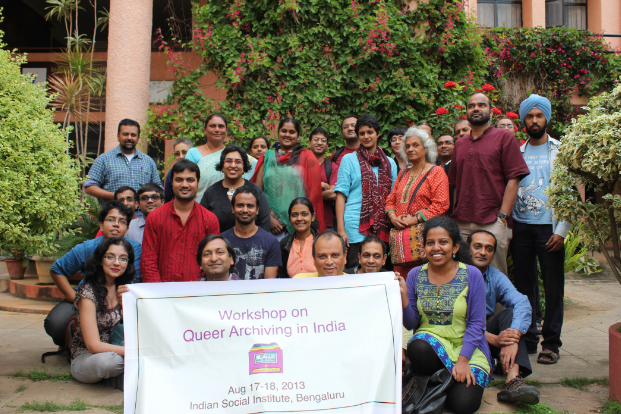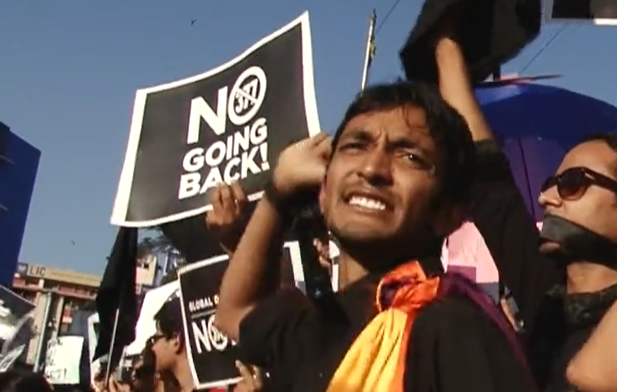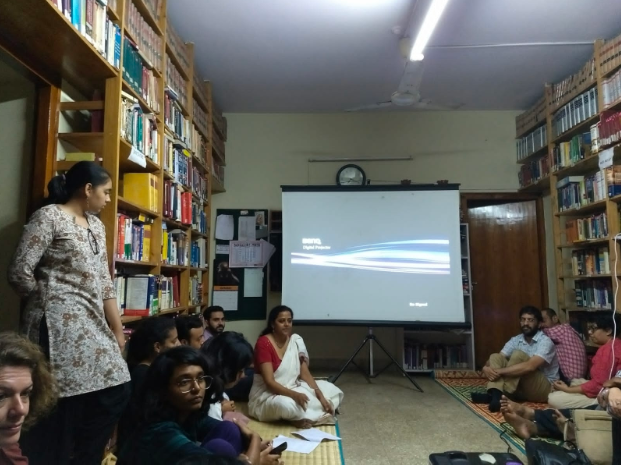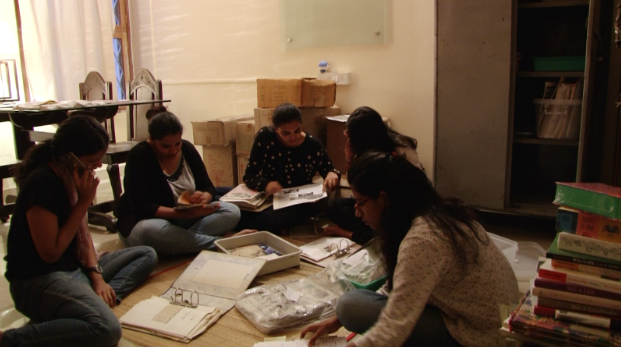Courting An Idea
The roots of the QAMRA Archival Project lie in first-person narratives recorded over the course of the Suresh Kumar Koushal & Anr. vs NAZ Foundation & Ors. case in the Supreme Court of India in 2012-2013. Based on detailed transcripts of proceedings that lawyers Siddharth Narrain and Tripti Tandon were sharing from within the court, activists worried about the narrow questions from the 2-judge bench and the direction the case was taking. Troubled by dismissals from the bench about “miniscule” sections of society, filmmaker T. Jayashree interviewed lawyers and a range of petitioners, many of whom had revealed their identities in the case without guarantee of a queer-affirmative future.
Soon after, activists in Bangalore organised a three-day queer archiving workshop, supported by the Institute of Development Studies, University of Sussex. The workshop was attended by many archivists, collectors and queer folks in India, and confirmed the need for an independent archives that would serve as a safe space for queer lives and memory in India.

In December of 2013, the Supreme Court overturned the much-celebrated 2009 Delhi High Court judgement, and effectively recriminalised same-sex relations. The Delhi High Court had, in a landmark judgement, read down Section 377 of the Indian Penal Code that penalised “consensual sex against the order of nature”, and held that it could not be applied to consenting adults (Naz Foundation vs NCT of Delhi).

Establishing an Archives
Efforts to consolidate queer histories continued. In 2017, while putting together clips of her unedited footage from the first Bengaluru Pride March(2008) for a screening at the Alternative Law Forum (ALF) in Bengaluru for the tenth anniversary of Pride in the city, T. Jayashree considered historian and activist Ponni Arasu’s advice to catalogue her multimedia documentation.
A retinue of student interns from St. Joseph’s College in the city began to help bring this vision to fruition at Jayashree’s studio in Bengaluru. The eager archivists considered what the integral aspects of this archive might be and came up with the name QAMRA – the Queer Archive for Memory, Reflection and Activism. QAMRA calls to mind the Hindustani word, kamra, that refers to a room. More expansively, QAMRA indicates an association with ‘camera’, also an enclosed assembly, that fits well with our history and multimedia collections.

After another landmark Supreme Court judgement in 2018, Navtej Singh Johar & Ors. vs Union of India thr. Secretary Ministry of Law and Justice, which decriminalised same-sex relations between consenting adults, two important collections came into T. Jayashree’s studio: the 377 case proceedings from the lawyers in Delhi and ALF, and documentation and organisational records from Sangama, the pioneering Bengaluru based sexuality-rights NGO. Documentation and correspondence from Sangama, the 377 legal collections, and the oral history collection became the founding collections of the QAMRA archive.
In the ensuing years, a QAMRA team toured queer archives in Europe and the USA, and brought on board Graeme Reid, founder of the GALA Queer Archive in South Africa. Today, the advisory team consists of experienced and dynamic members including Arvind Narrain, T. Jayashree, Deeptha Rao, Dr. Ponni Arasu, Thejaswi Shivanand, Vivek Divan, Dr. Niruj Mohan Ramanujan, Graeme Reid, Dr. Svati Shah, Curt Gambetta and Siddharth Narrain.

QAMRA Archival Project, NLSIU
In 2021, as the world began to consider a post-COVID-19 future, QAMRA moved to the National Law School of India University (NLSIU) in Bengaluru. The NLSIU has organic links with queer-legal activism in India; in 1997, law students organised a symposium on the rights of homosexuals on campus.The prospect of creating an institutional relationship between a public university and a queer archive was exciting for both.
QAMRA is currently housed at the NLSIU Library, and offers an archives-based elective course each academic year to the student community. Researchers, artists, students and all interested persons are welcome to browse and study our collections.